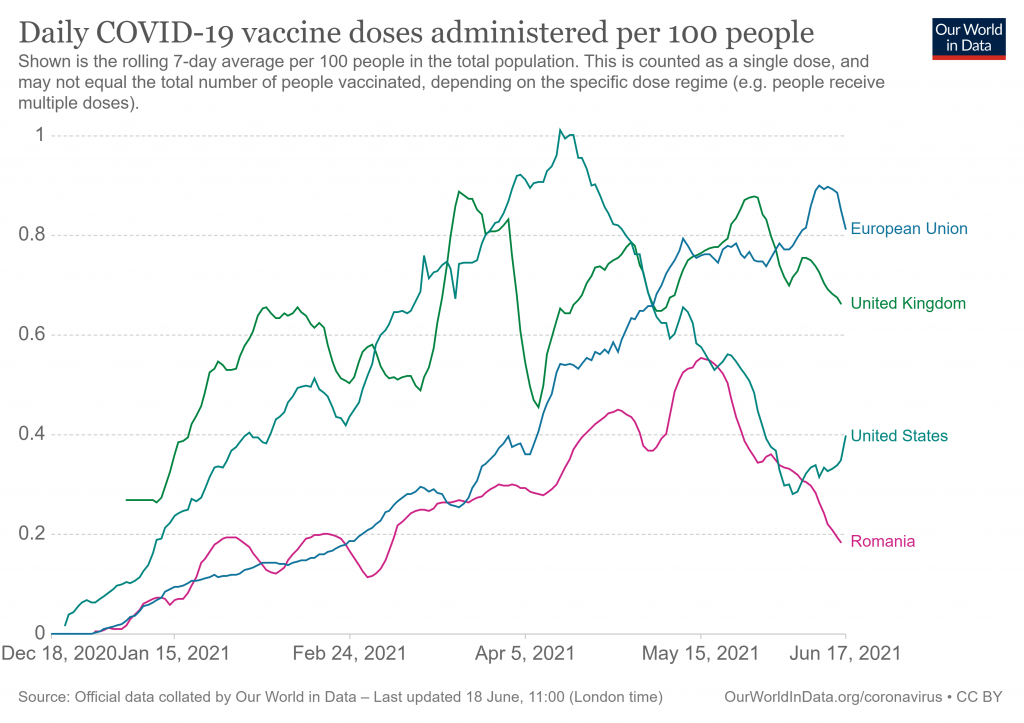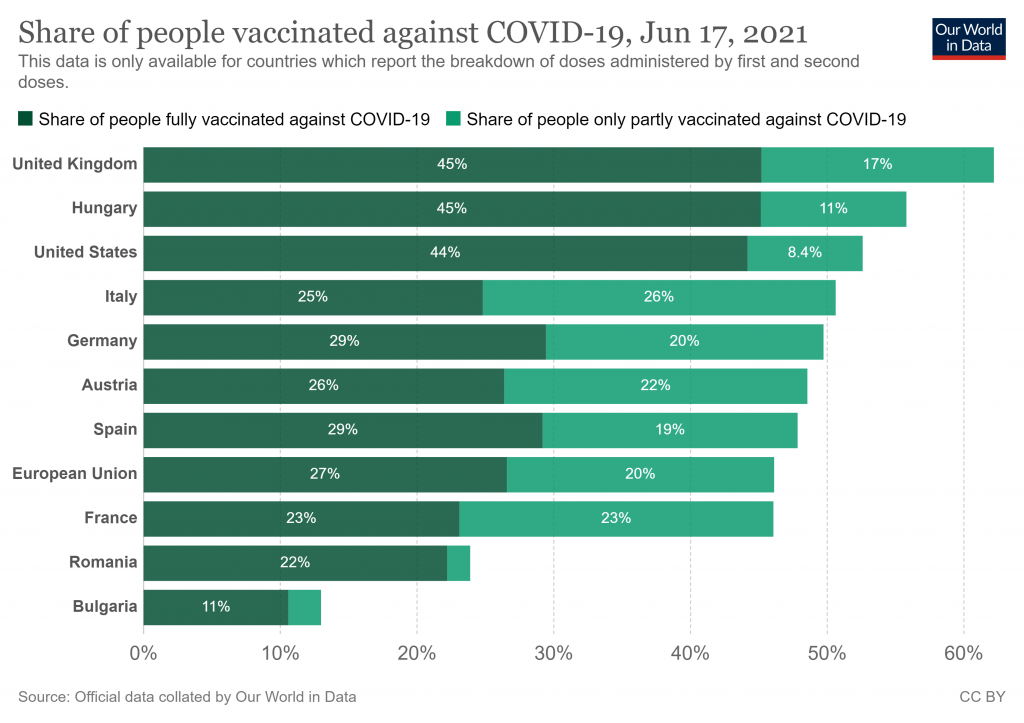We are increasingly convinced that we have left the pandemic behind. What was worse is now behind us and returning to normal life is just a matter of time. We are so convinced, that willingness to vaccinate is going down in most countries which until recently had massive vaccination rollouts.

Romania is no exception, but what makes it stand out is the overall low vaccination rate compared to the rest of the EU. We may have excelled in getting things up and running, but we failed the communication exam.

The situation shows a marked improvement if we are to judge by the spectacular drop in cases and deaths. The main risk is that we are not looking at the right indicator and once more, we are reactive and not proactive. Here are two reasons of concern.
Firstly, this is season related and has been seen throughout most of the world over the past 12 months where the warm season inhibits transmission while cold weather tends to promote it. The severity of effects after the cold season has returned will be directly related to the share of the unvaccinated population. And here Romania does not fare too well, which takes us to the second main reason for concern.
The significant share of the unvaccinated population might prove to be a very important issue as the idea according to which country-level herd immunity may be a pre-requisite but not enough to curb the pandemic is gaining ground. In fact, it may be entirely possible that the pandemic will never be completely eradicated, warn six experts in a Foreign Affairs article entitled “The Forever Virus”.
The piece mainly says that so long as a large share of the global population remains unvaccinated, either because it cannot or will not do so, they will continue to be a breeding ground for future virus mutations. And the speed of mutations will outpace vaccine production capacity at a global scale.
How is this a problem?
The European country with the highest number of vaccinated people, the UK proves that it is. Despite the large number of vaccinated individuals, the number of cases is going up on account of the Delta variant, known as the Indian variant. Just as an National Geographic article warns, this variant is already present in 70 countries. Ninety percent of UK cases are caused by it which has led to a 65% increase in infections since early May.
The Delta variant spreads twice as fast as the Wuhan strain. Moreover, it can elude the antibodies acquired from previous illness or decrease vaccine effectiveness. Thirty-one percent of Delta variant patients in the UK had only received a single dose. According to the National Geographic article, the Delta variant can reduce Pfizer vaccine effectiveness from 93% to 88% after full vaccination. A single dose will see the effectiveness drop from 51% to 31%.
What can we conclude?
The information above may have many sceptics wonder: as vaccines are less effective against new variants, why get the jab? This is the wrong way to look at causality. The higher the number of unvaccinated people, the more variants there are. The lower the number, the slower the rate at which new mutations emerge which will keep existing vaccines effective.
The second conclusion would be that the prospect of going back to social distancing to keep contagion under control is a very real possibility. Protection measures remain effective ways to limit the spread of the new variants. The monitoring and management of the spread will need to be fine tuned and focused on the main categories of carriers. The main category of carriers in the UK are the under 20 years of age.
One additional comment to make sure we will not reach the wrong conclusion. Romania has turned out to be one of fastest EU countries to close down schools. This should not happen again, given the serious consequences such measures have on the young generation and the future of the country. Like all countries that value development and competitiveness, the right measures that prioritize the continuity of the school system must be taken. Schools must be the last to be shut down, not the first.
A third conclusion is that the healthcare system needs to be flexible and well-equipped to respond to the new waves that may emerge in the cold season and the spread of new virus strains. Keeping whole hospital wards empty and healthy workers on standby just in case as the undersecretary suggested, is not efficient. At the end of the day, which country keeps tens of empty plants with people on the payroll awaiting the breakout of war? The key lies in flexibility and sectorial conversion. Especially in the case of less developed countries.
The fourth and probably the most important conclusion is that rushing to give people a sense of security will cause consistent health behaviors and willingness to vaccinate to drop and will create major vulnerabilities. One of the consequences will be volatility of economic developments.
The warning of the expert authors of the National Geographic article should be taken very seriously:
“Relaxing public health restrictions and declaring victory prematurely could provide an opportunity for the Delta variant to surge–particularly in the fall”.
Have a nice weekend!
Subscribe to receive notifications when new articles are published
